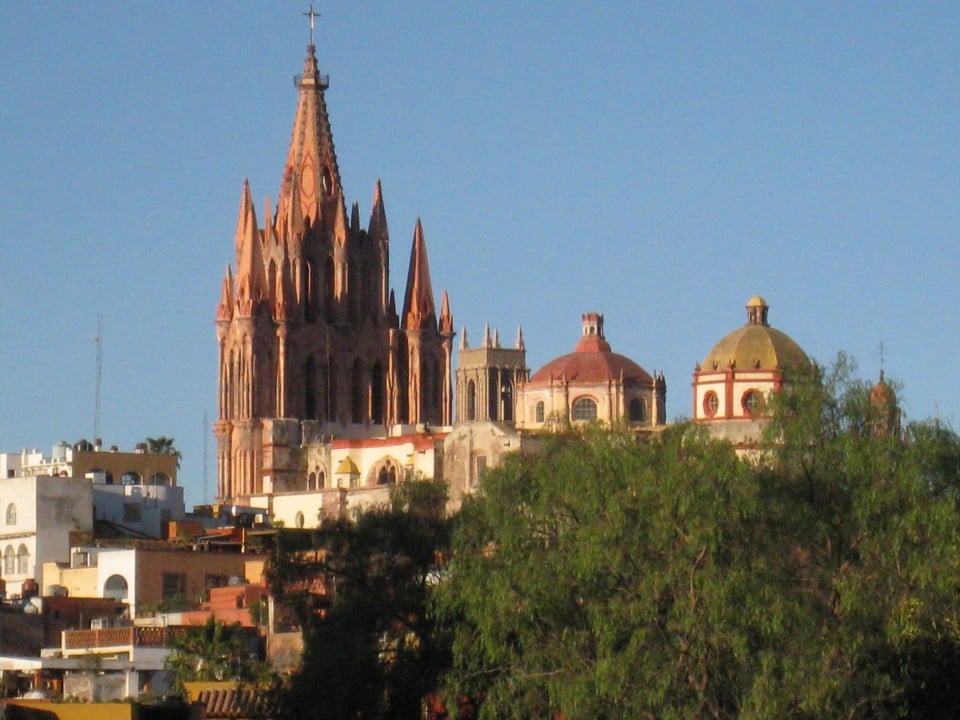
Our second visit to San Miguel de Allende felt entirely different from the first. Four years ago (February 2009), we stayed at the lovely Posada Carmina, walked all over town and took in as many sights as we could. We’d had no idea what to expect, and were won over by the weather, the history, and the art. It was a week’s vacation.
This time we’re in the midst of a longer and more widespread tour of Mexico, and we traveled to San Miguel mainly to see family. My sister-in-law is nearing the end of her four-month stay in SMA, having rented four different places for a month each.
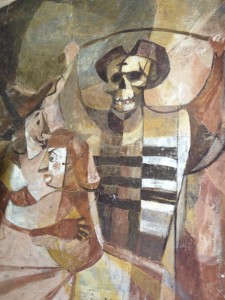
(While she was escaping the dreary winters of the Pacific Northwest, my two nephews and their girlfriends managed to make their way to Mexico for a bit of sunshine and freeloading–just like us! Last week, the elder nephew set off from San Miguel on a bicycling escapade through Central and South America. Read about Lars and Jenny’s bike journey at Tours in Tune.)
So what’s the difference between San Miguel then and now? Nothing and everything, say the locals and the expats. The natives are amazed at the growth. The gringos still talk about how many gringos there are. I heard anywhere from 2,500 to 6,000 to 12,000 foreigners were living in SMA, a town of 160,000. The spread is, I suspect, partly due to seasonal variation and partly from counting just North Americans vs. all foreigners. The truth is that in a small town like San Miguel de Allende, visitors and expats are more visible than in a big city.
Though we didn’t walk through the outer edges of the town this time, we know that some neighborhoods are thoroughly Mexican, and others are not. There is new urban sprawl to the north. Rows of townhouses look mostly unoccupied, perhaps suffering the same fate as some of the communities in Spain. The influx slowed with the economy in 2010, and more houses went on the market, many offered by expats. Currently, some natives benefit from the growth and others don't. Some gringos are year-round residents and others are not. And some visitors are more welcome than others. Go figure.
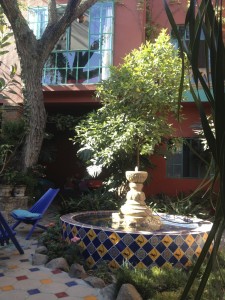
The Casa del Alma where we stayed is in the San Antonio neighborhood, just a fifteen-minute walk to the center, and a couple minutes to the big Mercado San Juan. Like most of the areas outside the very center, the street scene and shops and language are mostly native Mexican. For rental stays of a month or more, we’d recommend this neighborhood.
A couple favorite hangouts of ours are the library (Biblioteca de San Miguel de Allende) and the Instituto Allende. The library is centrally located and a great place for meetings, research, writing, and a coffee or refreshment in the Café Santa Ana. The converted home is an historic site in its own right. Check out the murals by David Leonardo.
The Instituto, about 10 minutes walk south the center, houses classes, galleries, shops, and a relaxing café in one corner of the shady courtyard. This is where my sis-in-law met with her Spanish teacher on a daily basis. The restaurant, Mi Casa, faces outward from the Institute, providing a quiet place with consistently good food. The patio extending from the restaurant offers a magical view of the Paraoquia to the north. Music and lecture programs are held here fairly regularly. Visit the B'nai Or Art Gallery or others on site for a nice range of work for sale by SMA artists. Most original pieces were in the range of $300 to 3,000.
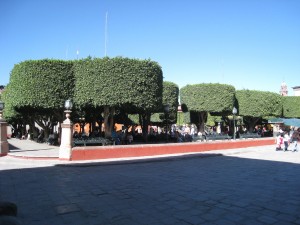
In the center, eats, shops and parks are plentiful. Just take a seat in the Jardín Principál (main garden) and watch the world go by. Both the Paróquia church and the town's history museum on the square are worth visiting. Our favorite pozole soup is served on a rooftop nearby, at La Posadita.
New discoveries this trip included some ‘everyday’ places, and are consequently locally owned and supported. For the real deal on Mexican tortas (sandwiches) and delicious smoothies, visit Torta, Jugos, Licuados Independencia at Independencia 47, San Rafael neighborhood. We found many new organic groceries around town, and returned frequently to Mercado San Juan de Dios for groceries. Excellent bakeries are easy to come by. For entertainment, visit Juan’s Café (across Relox from the Biblioteca) to buy a DVD, or pick up the schedule for the informal Cinema Splendor at Hernandez Macias #83, where ten dollars buys admission, popcorn and a beverage. Music from around the world is plentiful at various bars in the center.
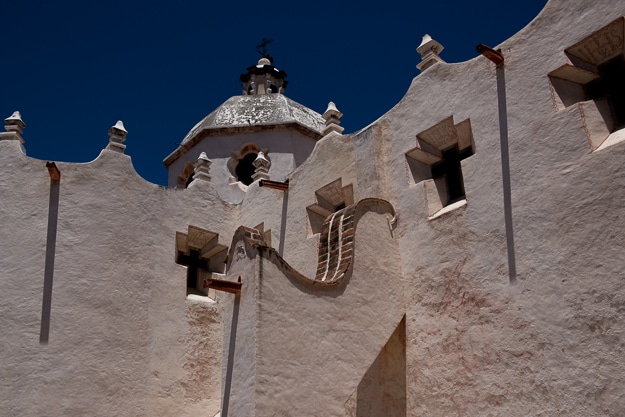
Our two day trips were well worth the effort. We taxied up to Atotonilco (20 minutes or so), to see the church (saved from decay after being named a Unesco World Heritage site) and the memorials to Hidalgo and the soldiers who started near here on their way to revolutionizing Mexican history in 1810.
The state capitol is Guanajuato, about an hour bus trip from SMA. Other than the fact that we visited on a Monday when all the museums are closed, we had a great time wandering this colonial and university town. The many parks scattered through town are busy with youth passing the time (a contrast to the older San Miguel). A crazy maze of tunnels under the central city was built about 10 years ago to keep traffic off the main streets. So it’s a good walking town.
Next time, maybe we’ll rent a car and see more of the colonial gems tucked into the mountains between Guanajuato and the lakes of Chihuahua just west, following the intrepid bikers.
Up Your Travel Skills
Looking to book your next trip? Use these resources that are tried and tested by us. First, to get our best travel tips, sign up for our email newsletter. Then, be sure to start your reading with our Resources Page where we highlight all the great travel companies and products that we trust. Travel Accessories: Check out our list of all the accessories we carry to make getting there and being there a lot easier. Credit Cards: See our detailed post on how to choose the right travel rewards credit card for you. Flights: Start finding the very best flight deals by subscribing to Thrifty Traveler. Book your Hotel: Find the best prices on hotels with Booking.com. See all of the gear and books we like in one place on our Amazon shop.Got a comment on this post? Join the conversation on Facebook, Instagram, or Threads and share your thoughts!

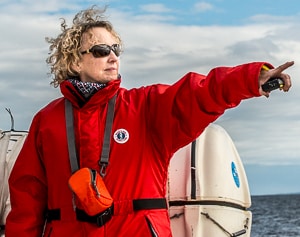
Comments are closed.